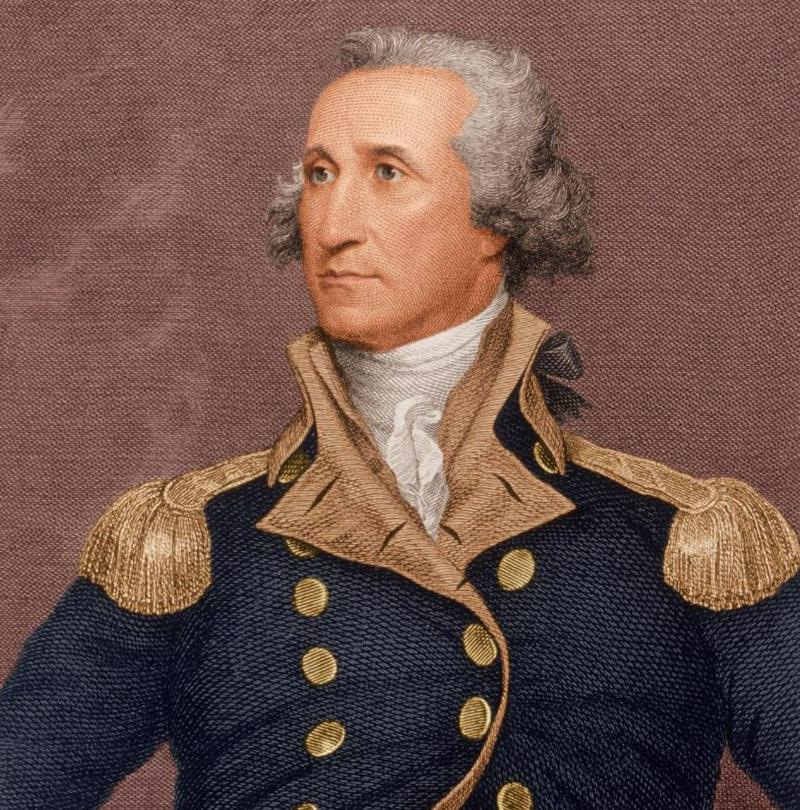George Washington: Biography, About, Facts, & Things You Didn't Know
By | February 20, 2021

George Washington was many things: a plantation owner, a land surveyor, a general, a statesman, and of course, the first president of the United States. As early as kindergarten, American children are taught about the Founding Grandfather—along with a hefty dose of untrue legends.
Washington Didn't Have Wooden Teeth
In his youth, G. Dub had a bad habit of cracking walnuts open with his teeth that caused them irreparable damage by the time he was a young adult, but contrary to legend, his false teeth were not made out of wood. It was actually grosser than that: They were made out of human teeth pulled from the mouths of poor people in exchange for a few coins or forcibly taken from slaves and corpses. He also occasionally wore dentures made from cow's teeth, elephant ivory, and lead, but no matter the origins of his falsies, they were so painful that he could only eat soft food like pancakes, soup, and bread unless it was cut into tiny pieces. In fact, Washington's false teeth caused him so much discomfort that he rarely smiled.

The Cherry Tree Incident Never Happened
One of the more popular myths about George Washington is that he chopped down a cherry tree for fun as a child, and when he was confronted, he told his father, "I cannot tell a lie." It first appeared in the 1800 book The Life Of George Washington by Mason Locke Weems, who invented or exaggerated much of its content to fluff up Washington's image as a paragon of virtue with the hope that everyday Americans would follow suit.

Washington Wasn't An Impressive Student Or Soldier
Young George's two older brothers went to one of the finest schools in England, and George had planned to follow them when he finished his primary school education in the colonies, but his father's death when he was 11 years old put an end to his educational aspirations. His mother never remarried and relied on George to help with the family's tobacco farm. As a land surveyor and plantation owner, Washington was a success, but he was always embarrassed about his lack of education.
Our history textbooks leave us with the impression that George Washington was a great general who rarely lost his battles, but in reality, Washington was defeated far more often than he was victorious. One of his first big defeats led to the French and Indian War when Washington, then an officer for the Virginia militia, arrived in western Pennsylvania with 150 soldiers, received word that the French were camped just a few miles away, and slipped through the woods with about 40 men for a surprise attack. The fighting lasted only about 15 minutes, and in the end, one Virginian and a dozen Frenchmen were dead, including French nobleman Joseph Coulon de Villiers, Sieur de Jumonville. The French claimed that Jumonville was on a diplomatic mission when he was assassinated by George Washington, and tensions rose between the Americans and the French until war broke out. Even during the Revolutionary War, Washington's troops endured defeat after defeat.

Washington's Love Life: It's Complicated
We all grew up learning about Martha Washington, but George's wife was not his first love, nor was he hers. As a gawky teenager, Washington fell in love with the beautiful young wife of his best friend and patron, George Fairfax, but it appears that Mrs. Fairfax responded to his affections with nothing more than friendship and not a little pity. According to historians, she took Washington under her wing and instructed him on social graces and even how to dance.
Meanwhile, Martha Dandridge married Daniel Parke Custis in 1750, but just seven years later, Mrs. Custis was a widow at 25. Two years later, she found herself being courted by both Washington and Charles Carter, who was much wealthier and seemingly a far better prospect. In the end, she chose George, who became a father figure to Martha's two children but never fathered any of his own. Historians suspect Washington's bout with smallpox left him infertile.

George Washington, America's First Mule Breeder
In 1785, Washington became the first mule breeder in America after receiving a jack stud from King Charles III of Spain. Quickly realizing how useful mules are on a farm, he began breeding them at Mount Vernon, advancing agriculture in the American South for decades to come.

Washington Didn't Want To Be President
When the Revolutionary War ended, Washington hoped for a quiet retirement with Martha back at Mount Vernon, but he still felt the call to serve his newly formed country, so he worked with the Constitutional Convention to draw up the framework for the new government of the United States. The Constitution had not yet been ratified when word spread that Washington was the likeliest contender for the presidency. He was torn: He longed for the simple life of the farm, but never one to turn down his country, he accepted the presidency.

Washington Feared Being Buried Alive
During Washington's time, being mistaken for dead and buried alive was unacceptably common, and he feared it so much that he requested his body not be buried for three days after his death, just in case. In the end, it was the common cold that took down a man who had survived bouts with malaria, smallpox, diphtheria, pneumonia, dysentery, near drowning in an icy river, burning buildings, and bullets that came so close as to tear his clothing. The cold turned into a throat infection that would be easily cleared up with antibiotics today, but his options at the time were limited, specifically to bloodletting. Washington's doctors drained as much as 40% of his blood, but despite (or more likely, because of) their efforts, he died on December 14, 1799.

